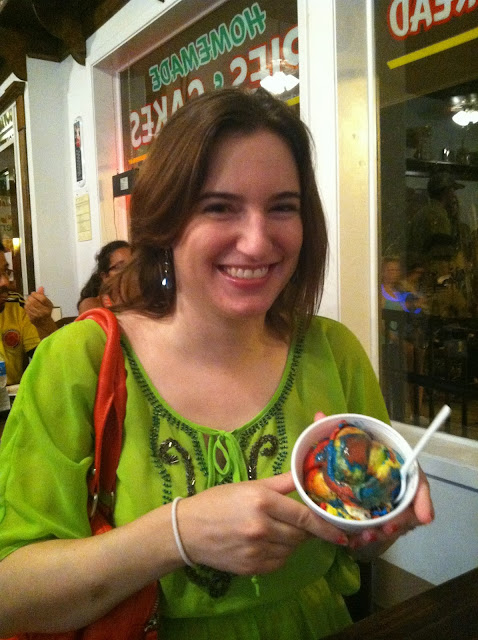The other day, I was struck by a little inspiration. I had just added "The Year of Reading Dangerously" by Andy Miller to my
Goodreads list, about all the books he's claimed to have read but had never actually gotten around to reading, and his resolution to get through some of them.
Now, I haven't read it yet, and I don't lie to people about what I have or have not read, but I started thinking about all the books that I've been wanting to read for a long time, but haven't gotten around to yet. Books that have made a big impression on readers, or books that are classics, or books that just came highly recommended by someone at the right time.
So I made a list of the top 20 that have been languishing on my to-read list. I think I'd like to make those books my reading goal for 2015.
1)
"Oryx and Crake" by Margaret Atwood. I asked for the second book in this series ("Year of the Flood") a few years ago for Christmas, not realizing that it was not a standalone book. I still haven't gotten around to reading the first one in the series, and should probably get on that.
2)
"The Catcher in the Rye" by J.D. Salinger. I've been told that I need to read this before I turn 30, because only young people can appreciate it. I don't know if this is true or not, but 30 is only a couple of years away, and I'd hate to miss out.
3)
"The Canterbury Tales: A Retelling" by Peter Ackroyd/Geoffrey Chaucer. I bought this at a book sale like three years ago, and never read it. It's supposed to be a more modern translation of the original Chaucer, which is good, because … I'm kind of embarrassed to admit that I have a hard time understanding and getting into Old English. (I mean, I've never even read Shakespeare without side-by-side modern English translations.)
4)
"The Slaughterhouse-Five" by Kurt Vonnegut. It's about time I read something by Vonnegut.
5)
"East of Eden" by John Steinbeck. My
one and only book regret was not finishing this one in high school. Now I've got to start all over because the only things I remember about it is that it was really messed up and the main character's name was Adam.
6)
"The Immortal Life of Henrietta Lacks" by Rebecca Skloot. My book club read this a while back, but I didn't, because I don't like medical stuff. I have been assured that it will not upset my hypochondria.
7)
"The Idiot" by Fyodor Dostoyevsky. Even though I didn't manage to make it through "Anna Karenina," I want to give Russian literature another go. I feel like the author must have a sense of humor with that title.
8)
"Little Women" by Louisa May Alcott. I think I'm the only girl in the world that never read this book as a kid.
9)
"Vanity Fair" by William Makepeace Thackeray. Totally inspired by the Reese Witherspoon movie that came out 10 years ago. I didn't see the movie, but the trailer made it look really good, and … well, if the trailer is good, the book must be good too?
10)
"A Moveable Feast" by Ernest Hemingway. I also managed to get through high school without reading any Hemingway.
Amanda told me that this one is really good.
11)
"Memoirs of a Geisha" by Arthur Golden. I wanted to read this in college, when a friend was obsessed with it. I wanted to read it when the movie came out. I wanted to read it after I saw the movie. Now I've forgotten what happened in the movie, and so I
have to read it.
12)
"Fahrenheit 451" by Ray Bradbury. You can't go wrong with a book about books! Another one I didn't finish in high school.
13)
"Les Misérables" by Victor Hugo. The
movie was good. I'm not sure if I have the abridged or unabridged version, but I'm going to read the one I already have on my shelf.
14)
"Harry Potter y La Piedra Filosofal" by J.K. Rowling. Yes, I've read Harry Potter a bazillion times, but you know what I have not done? Read it in Spanish. THAT'S RIGHT. #micdrop
15)
"The Poisonwood Bible" by Barbara Kingsolver. I've heard that this one is kind of … classic-adjacent? I liked the last Kingsolver I read ("Animal Vegetable Miracle"), but my grandma told me she hated this one.
16)
"This is the Story of a Happy Marriage" by Ann Patchett. This one keeps popping up in my periphery, and
David Sedaris is going around recommending it, so … I just do what David Sedaris says. :)
17)
"Delancey: A Man, A Woman, A Restaurant, A Marriage" by Molly Wizenberg. The movie just came out, and the trailer looked so good.
18)
"The Marriage Plot" by Jeffrey Eugenides. Matt and I were listening to the audiobook of "Middlesex" last year and decided it was too weird/boring to finish. But I will give Eugenides one more chance.
19)
"The Thornbirds" by Colleen McCullough. I have no idea what this one is about, but it came SO highly recommended by an online book group I'm in that I feel no choice but to read it.
20)
"The Complete Sherlock Holmes" by Sir Arthur Conan Doyle. I love Benedict Cumberbatch's
Sherlock, and Matt tells me the books are almost identical to the show. (It actually encompasses two enormous books.) One of the few times in which Matt can say he has read something that I haven't!
Have you read any of these? What books have been on your to-read list forever? Do
you ever lie about what you've read?

























